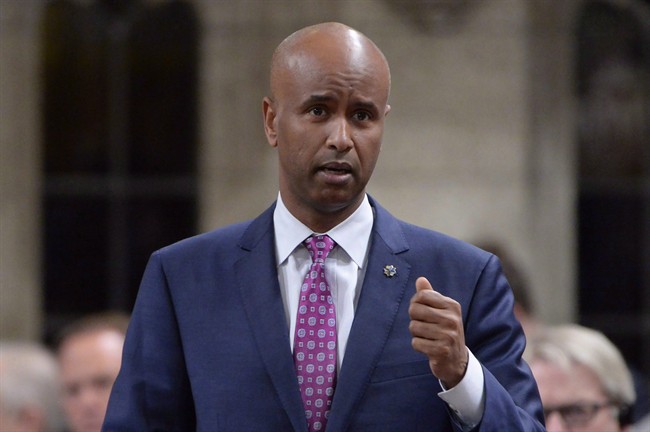OTTAWA – Next steps for Canada’s policy on taking medical conditions into account when accepting or rejecting permanent residents will be laid out by mid-April, Immigration Minister Ahmed Hussen said Thursday.

The Liberals have been under pressure for months to overhaul the medical inadmissibility provisions of Canada’s immigration law, which allows the government to deny people permanent residency if, for example, their condition would create “excessive demand” on the health care system.
READ MORE: Immigration Canada reverses decision, grants residency for family denied over child’s disability
Advocates and opposition politicians say it discriminates against people with disabilities; in December, the House of Commons immigration committee recommended the entire provision be scrapped.
The Liberals have agreed the program is problematic, a message Hussen repeated Thursday in his testimony before the House of Commons immigration committee.
“The policy is out of step with Canadian values on accommodating people with disabilities.”
Hussen said the government has been consulting with provinces, and wanted to review the committee’s own report before deciding how to move forward. The response will come by April 12, Hussen said – the deadline for the government to respond to the committee report.
“I will encourage you to wait for that response and in that response you’ll find how we’re proceeding on this issue,” he said.
WATCH: Advocates demand Trudeau end ‘unjust’ immigration law, call it a ‘black eye’ for Canada
The Liberals have been discussing the issue since 2016, said NDP immigration critic Jenny Kwan.
“He might have the luxury to wait, but the family members don’t,” Kwan said. “They have been separated and they need a policy change. What is the holdup?”
About 1,000 permanent residency applications are flagged each year for medical inadmissibility, Kwan said. It can lead to an entire family being rejected on the grounds that one member has a disability.
Hussen was also questioned at length on Thursday about asylum seekers streaming over the Canada-U.S. border between legal checkpoints.
He told Conservative MP Michelle Rempel that there are “no formal negotiations” taking place to change the Safe Third Country Agreement. The agreement currently allows people coming from the U.S. to try to claim asylum in Canada if they cross the border away from a checkpoint.
-With a file from Global News




Comments